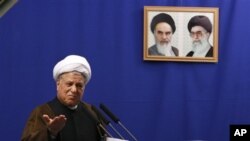State-run Iranian media report former president Ali Akbar Hashemi Rafsanjani has been voted out as chairman of the country’s highest governmental body of clerics. Analysts say the move is part of a gradual assault by hardliners on Rafsanjani for both his political position and his prominence.
In what Western analysts concur is a victory for his conservative rivals, Ali Akbar Hashemi Rafsanjani was voted out Tuesday as chairman of the powerful Assembly of Experts. He was replaced by the 80-year-old Ayatollah Mohammad Reza Mahdavi Kani, a more traditional conservative whom analysts believe had the backing of Supreme Leader Ali Khamenei and President Mahmoud Ahmadinejad.
The Assembly of Experts is an 86-member body of Islamic clerics that in theory monitors the job performance of the Supreme Leader, but in practice exercises little day to day authority. But it appoints the country’s Supreme Leader, a post held only by two men since the Iranian Revolution that overthrew the monarch, or Shah, in 1979.
Rafsanjani has held most of the most powerful positions in post-revolutionary Iran: president, speaker of the parliament, Assembly of Experts chairman, and chair of the Expediency Council.
After the government’s crackdown on the opposition following the hotly contested 2009 presidential election, Rafsanjani was careful in his criticism of the government and never completely allied himself with the opposition movement. But as former National Security Council staffer Gary Sick, now a professor at Columbia University and a leading Iran affairs scholar, says, he still earned the government’s enmity.
"They have not attacked him personally in the sense of arrest or something else. But it has been moving closer and closer in that direction as the regime clamps down and basically operates on the basis that you are either with us or you are against us. And I think that increasingly Rafsanjani has been seen as someone who is against them and therefore subject to very severe opposition, if not sanctions. And I think that is what is emerging. It is a slow-motion process," said Sick.
George Mason University Modern Middle Eastern History Professor Shaul Bakhash says the course Rafsanjani has been trying to steer no longer protects him.
"He is a centrist, by and large, and a pragmatist, and this does not go well with the hardline positions that have been growing in influence in Iran. He is resented in many quarters, so this is payback time and revenge time, and we have seen much evidence of this," Bakhash said.
Rafsanjani’s daughter was arrested at least twice for expressing opposition views. One of his sons who lives abroad has been indicted for bribery. Another son who was the head of Tehran’s Metro system recently resigned after his request for improvement funds was denied. And Rafsanjani's privilege to speak at Friday prayers at Tehran University was cut off.
But will Rafsanjani drift further into the opposition camp? Shaul Bakhash says it would be a very risky move in the current climate.
"Rafsanjani is vulnerable. He and his family have very widespread business and economic interests in Iran, and these could always be subject to attack by the government, by prosecutors, and the like. So I think that he would be taking a big risk if he were to side more with the opposition as a result of his removal as the head of the Assembly of Experts," Bakhash said.
Having lost much of his standing, Rafsanjani faces another challenge next year when his term as chairman of the Expediency Council, which mediates disputes between the powerful, but unelected, Guardian Council and parliament, expires.
Former Iranian President Loses Prestigious Post





